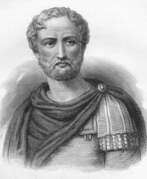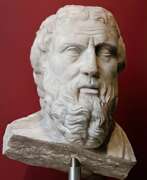Historians 1st century


Gaius Pliny Secundus (Latin: Gaius Plinius Secundus), known as Pliny the Elder, was an ancient Roman polymath, writer and statesman.
Pliny came from a wealthy family and was educated in Rome. In military service in Germany, he rose to the rank of cavalry commander, and then returned to Rome and was appointed governor of the province. In addition to public affairs, Pliny was engaged in the study of nature, wrote various scientific works.
His book Natural History has reached our time. This is an encyclopedic work, which became an authority in Europe in scientific matters until the Middle Ages. Natural History has historical significance as one of the greatest literary monuments of classical antiquity. It is still of value to those who wish to gain an insight into first-century Rome from a primary source.
In the year 79 Pliny was appointed by Vispasian to command a fleet in the Bay of Naples, and found himself near Vesuvius at the time of its eruption. He went ashore, where he died as a result of the natural disaster.


Plutarch, full Roman name Lucius Mestrius Plutarch, was an ancient Greek writer, historian and philosopher of the Roman era.
Plutarch came from a wealthy family, received a good home education, then studied in Athens with the Platonic philosopher Ammonius. In his youth he traveled a lot, twice visited Rome, where he gave public lectures, visited Alexandria, the cities of Balkan Greece. But most of his life Plutarch spent in his native Cheronea, where he was engaged in public and educational activities. At the age of about 50, he became a priest of Apollo at Delphi, as well as an honorary Athenian and Roman citizen.
Some of Plutarch's writings are devoted to various philosophical, didactic, and historical topics. These include "Moral Essays" or "Moralia", "Platonic Questions", "On Monarchy, Democracy and Oligarchy", "Instructions on State Affairs" and others. Plutarch wrote a lot of biographical works, among them "On the Fortune and Valor of Alexander the Great". The greatest popularity enjoyed "Comparative biographies", in which Plutarch recreated the images of prominent political figures of Greece and Rome. In total, 46 paired and 4 single biographies have survived.
A lot of Plutarch's publications are devoted to family and human values in general, which he considers in great detail. Plutarch's humane writings were popular during the Roman Empire, retained their importance in the Byzantine period, and with the beginning of the Renaissance became an integral part of humanistic European culture.